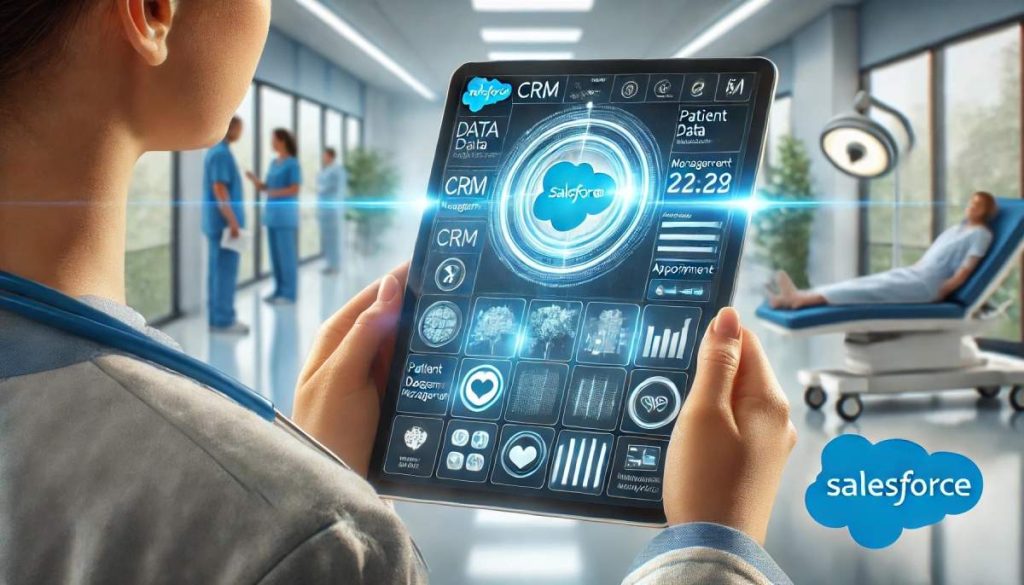As has been observed in the modern and constantly developing context of the Healthcare CRM industry, the CRM strategies remain critical for achieving high levels of organizational performance and satisfaction of customers that are patients. Salesforce, is a state-of-art CRM that provides healthcare providers with the necessary capabilities to enhance interactions with patients, align patient-centric processes, and drive the right decisions that will improve patients’ health. Here are five critical factors putting Salesforce at vantage as the preferred CRM by healthcare firms
Table of Contents
Toggle1. Connect Siloed Systems
- Hospitals today are fragmented since patient information is fragmented across the different departments, applications, and platforms.
- This leads to inefficiencies, communication leakages associated with transferring files between different departments of a hospital, and delayed care.
- The system of Salesforce unifies the systems that are split across the organization, so it is for the clinicians to connect the clinical, operational, and administrative data on a common platform.
- EHR (Electronic Health Record), scheduling application, billing, and patient engagement tools are available as one ecosystem in health care with the use of Salesforce help healthcare teams have one place for the truth.
- This approach to the patient data also enhances cooperation on aggregate patient’s information and make sure all tied relating to a patient gets latest data no matter of whether it may be a doctor, nurse or the billing department.
For example, in salesforce’s Health Cloud assists in the management of patient cycle by collecting information about the problem and/or its solution, the care continuum that includes diagnosis, treatment, and the supervision of outpatient’s recovery process. This connectivity makes work easier as it eliminates repetition and reduces error, hence improving the patient’s status.
2. Use Data Intelligently
- Healthcare has become an information business, so using information properly could determine whether one gives adequate treatment or superior treatment.
- There are indeed very strong and flexible analytics tools that Salesforce provides which can be used to derive relevant firm specific insights about patients.
- A solution with sound reporting features with reference to dashboards enables healthcare systems to make sound decisions regarding the provision of health care, rationing of resources, and engagement of patients.
- Feasible technologies in sales force such as Einstein Analytics support excusable anticipation of patient requirements and behaviors that would assist the medical industry in responding to the current needs appropriately.
For instance, through use of Salesforce, healthcare givers can easily recognize patients that are most likely to be readmitted to the hospitals and treat them earlier. Being based on intelligent data analysis, Salesforce assists organizations in improving their performance, cutting expenses, and providing better patients’ outcomes, in general. Furthermore, customization which is present in salesforce enables care organizations to change aspects like the dashboard and reports according to the working of distinct groups in care organizations.

3. Enhance Care Team Collaboration
- Interprofessional working partnership is important in health care organizations so that patients can benefit from multiple teams of caregivers.
- Through some of its tools, Salesforce enhances collaboration in that it allows communications between doctors, nurses, administrators and other stakeholders in healthcare.
- Some of the features present in Salesforce’s Health Cloud are Messaging, care plan, task among others is useful to support the team to communicate in real time.
- Salesforce consolidates patient data and information exchange which minimizes the potential for misunderstandings within a care team and/or between a patient and a care team member as well as keeps everyone involved aligned with the patient needs and the treatment plans developed for the patient.
For instance, if a patient must see several specialists, then using Salesforce, care teams can plan cooperative notes, updates and other important information in a secure platform. Such integration is most beneficial in cases of long-term treatment, which require constant cooperation between different practitioners.
4. Personalized Experiences
- In the present paradigm of treating patients as customers, customization is critical. Consumer Experience is the key to success, and the sales force supports the healthcare organization to make the patient experience extraordinary at every touchpoint.
- Through capturing patient data from interaction, healthcare providers are able to make customized communication, provision of treatment and service delivery to patients/clients.
- One key element of interacting with patients is that Salesforce automates some aspects of patient communications, such as sending alerts or customized instructions based upon the individual patient’s particular interests, as well as medical history.
- It also enhances the level of interaction with the patients apart from increasing the level of compliance among the patients to medical regimens.
For example, it can use the follow-up reminder if patients require an appointment or share information about the disease or prescribed medication with the patient.
In addition, using Salesforce, healthcare organizations are able to categorize patients according to demographics, diseases and other characteristics so that programs that are most beneficial for each group can be implemented.
5. Keep Data Secure While Continuing to Innovate
- Security and compliance are of paramount importance in the healthcare space as patient information solutions are disseminated heavily.
- Currently, Salesforce has adequate security features, which enables healthcare institutions to protect patient information and conform to the prescription of the HIPAA Act.
- Additionally, through ultramodern encryption mechanisms, as well as multiple-factor authentication and varying degrees of data access, patient information is safeguarded while employees who need the data can access it freely.
- Salesforce also provides features for data access audit and to track activities and so maintaining compliance in addition to protecting patient data.
In the same note, Salesforce promotes innovation with the added advantage of giving healthcare organizations the leeway to transform their operations on a regular basis. From the adoption of new technologies, care models or patient engagement capabilities, Salesforce provides a sustainable technology platform on which growth can be built.
Summing it Up: A 360 Degree View of The Patient
Recognizing the need to bridge the gap, Salesforce provides an effective healthcare CRM solution that integrates disparate systems, uses data wisely, promotes care team cooperation, and provides patients with personalized experiences all within a context of protecting patient privacy. Salesforce use by the healthcare companies will enhance efficiency of operations, the health of patients, and create adaptability in the knowledge-intensive environment. And with Salesforce, managing patient relationships goes beyond as healthcare organizations are actually redesigning interactions patients have with them, incrementally.
Starting using Salesforce as a healthcare CRM provides a holistic, 360-degree viewpoint of the patient thereby allowing organizations to treat patients appropriately and at the right time with standard healthcare compliance levels confidently.
Shashi Teja
Related posts
Hot Topics
Understanding TruthFinder’s Background Check Features
Background checks have become increasingly relevant for personal safety and information gathering in digital environments. TruthFinder offers comprehensive background check…
How MLOps Is Shaping the Future of AI in Business
Artificial intelligence (AI) has evolved from a futuristic idea to a strategic necessity for companies looking to innovate, grow, and…



